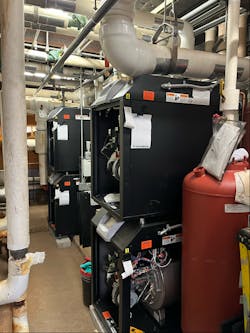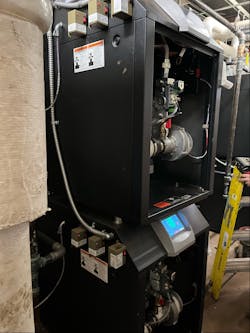PORTLAND, ME — Contractors prefer closed loop heating and cooling systems for many projects to prevent cross-contamination from external sources. Neglecting maintenance, however, can wreak havoc on the system and result in extensive and costly repair. The owner of a mixed-use building in Portland learned just how vast—and expensive—damage can be when a system isn’t properly serviced.
The 58,000 square-foot building dates back to the 1800s and has seen its share of renovations and updates. The building includes commercial and residential units, and the closed-loop heating system worked well for a long time.
But over time, problems started to emerge. “The issue we experienced was that in the closed loop system we found debris, sediment and corrosion from inside the pipe,’’ according to the property manager for the building. “So much sediment had gone through the system that every heat loop was cracked and showing signs of wear.”
The solution required a comprehensive system evaluation and eventually, boiler replacement. The path to getting there, however, proved as murky as the sky during a New England nor’easter.
System Analysis
The pH level of the water can also decrease (lowered pH can indicate bacterial growth or a system leak). Closed circuit systems require control of the water’s chemistry to prevent corrosion and freezing. Water treatment chemicals can help prevent corrosion and keep the system humming.
The Portland building included four boilers that provided hot water to the loop during the winter and a chiller that provided cool air during summer months. Contractors found the boilers in the single-pipe system started to trip and explored causes for the failures.
“We discovered it was likely settling in the lines,’’ the property manager said. “The contractor on the project flushed the line to get the sediment out. That was the first step, but it got to a point where there was so just so much sediment still getting through the line, and it was not being caught in any sort of filtering. We had to basically shut the system off.”
Boiler Breakdown
In some situations, flushing the lines will often solve issues with corrosion and buildup within the system. Flushing is the least costly and fastest solution. This project, however, required more extensive repair. Teams working on the project considered replacing the heat exchangers, but determined a more extensive solution was required.
“We looked at the cost difference between disassembling the boiler heat exchangers and the other work that was required for the scope of this project,’’ the manager said. “We got an idea of what it would cost, and it just made sense to replace the boilers for what was ultimately the same price.”
In With the New
The Elite XL model, which is available in seven sizes, includes a 4-pass 316L stainless steel ASME heat exchanger and three-pump control for the system, boiler and direct hot water. Up to 8 Elite XL boilers can be cascaded in a system, providing a much larger turndown ratio, increasing overall system efficiency and unit runtime rotation that eliminates downtime. The contractor worked with Tom Protasewich of Emerson Swan to help design the solution.
In terms of capacity, the new system was virtually a carbon copy of the one that had deteriorated. Installation required about two weeks.
In addition, contractors also looked to improve the filtration system to help mitigate any issues that might develop with sediment.
“Each boiler has a filtration vessel that helps catch smaller and larger parts of sediment,’’ the property manager said. “We increased our water treatment schedule and the frequency at which we’re doing it. We also increased our levels of monitoring. It’s a matter of being more proactive about the condition of the water. We now have redundant filtration systems in place to catch sediment before it goes through to our boilers.”
A water treatment program to help reach proper pH levels will also help ensure increased system longevity. Treatment should be part of any maintenance plan.
“The boilers were installed and put back on the loop,’’ the property manager said. “We have since switched it to cooling. We were checking some filters on a daily basis, and we would check the filter vessels on each boiler on a weekly basis. Then we went to every other week. Now, we just kind of do it on a monthly basis because the water coming through our filters have been running clean.”
Age-Old Problems
The property had been built more than 150 years ago, and renovations and updates had been made over time. But closed loop systems can decay rapidly if they are not properly serviced. It is hard to determine the age of the system in the building, but sediment buildup is the enemy for any closed loop system. “A lot of the sediment buildup and the filtration was basically a function of being a very old building,’’ the property manager said.
The lesson is a familiar one for any plumbing and heating contractor. Maintenance is often overlooked by building owners. In this instance, the age of the building was a factor in the decline of the system. Whether the system was installed decades ago or within the past few years, it is wise to invest time and resources for maintenance. The consequences for not doing so are usually dire—and expensive to remedy.
Thomas Renner writes on building, construction and other trade industry topics for publications throughout the United States.


